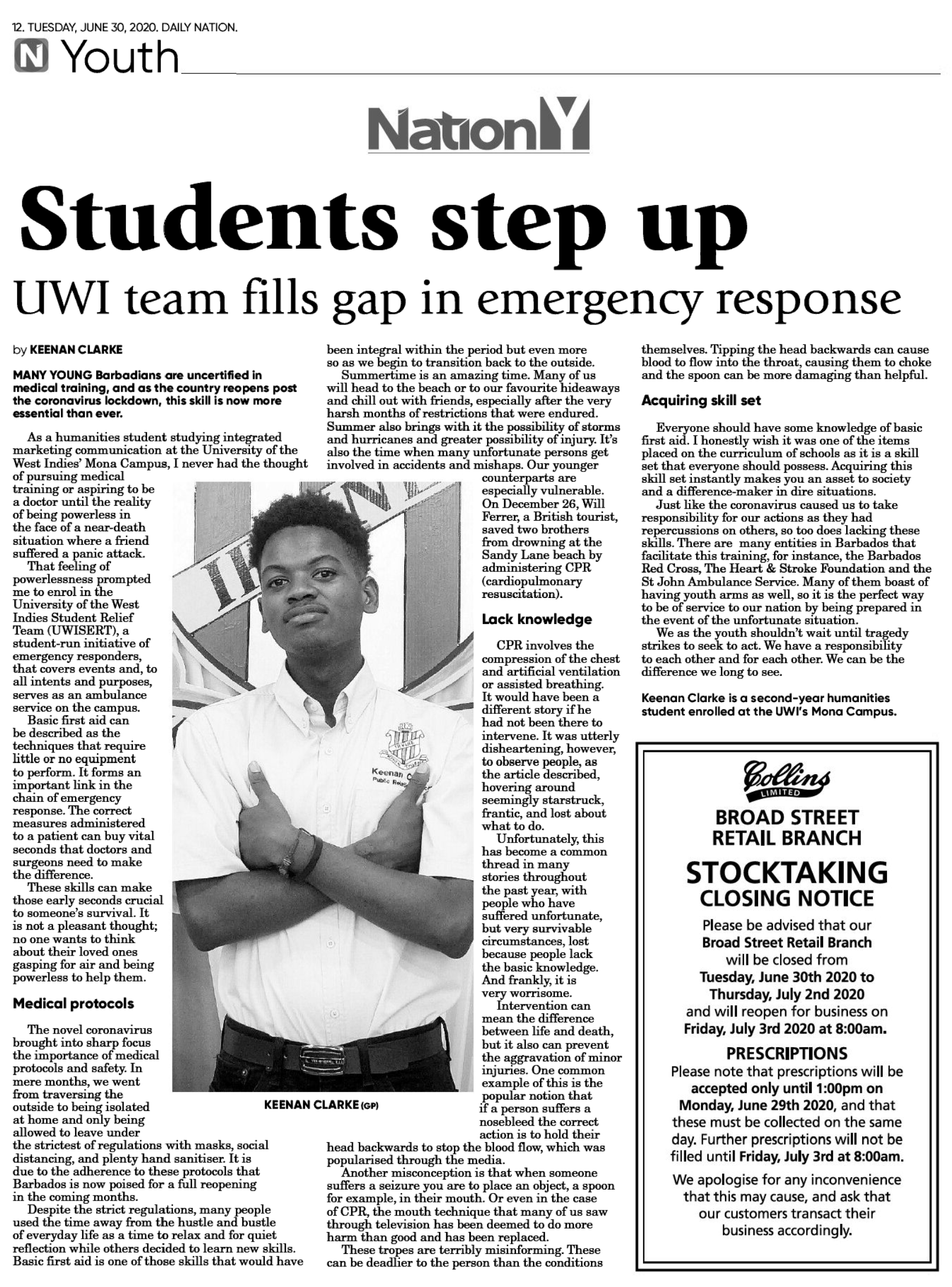Students step up
UWI team fills gap in emergency response
been integral within the period but even more so as we begin to transition back to the outside.
Summertime is an amazing time. Many of us will head to the beach or to our favourite hideaways and chill out with friends, especially after the very harsh months of restrictions that were endured. Summer also brings with it the possibility of storms and hurricanes and greater possibility of injury. It’s also the time when many unfortunate persons get involved in accidents and mishaps. Our younger counterparts are especially vulnerable. On December 26, Will Ferrer, a British tourist, saved two brothers from drowning at the Sandy Lane beach by administering CPR (cardiopulmonary resuscitation).
MANY YOUNG Barbadians are uncertified in medical training, and as the country reopens post the coronavirus lockdown, this skill is now more essential than ever.
As a humanities student studying integrated marketing communication at the University of the West Indies’ Mona Campus, I never had the thought of pursuing medical training or aspiring to be a doctor until the reality of being powerless in the face of a near-death situation where a friend suffered a panic attack.
That feeling of powerlessness prompted me to enrol in the University of the West Indies Student Relief Team (UWISERT), a student-run initiative of emergency responders, that covers events and, to all intents and purposes, serves as an ambulance service on the campus.
Basic first aid can be described as the techniques that require little or no equipment to perform. It forms an important link in the chain of emergency response. The correct measures administered to a patient can buy vital seconds that doctors and surgeons need to make the difference.
These skills can make those early seconds crucial to someone’s survival. It is not a pleasant thought; no one wants to think about their loved ones gasping for air and being powerless to help them.
Intervention can mean the difference between life and death, but it also can prevent the aggravation of minor injuries. One common example of this is the popular notion that if a person suffers a nosebleed the correct action is to hold their head backwards to stop the blood flow, which was popularised through the media.
Another misconception is that when someone suffers a seizure you are to place an object, a spoon for example, in their mouth. Or even in the case of CPR, the mouth technique that many of us saw through television has been deemed to do more harm than good and has been replaced.
These tropes are terribly misinforming. These can be deadlier to the person than the conditions
by KEENAN CLARKE
Medical protocols
The novel coronavirus brought into sharp focus the importance of medical protocols and safety. In mere months, we went from traversing the outside to being isolated at home and only being allowed to leave under the strictest of regulations with masks, social distancing, and plenty hand sanitiser. It is due to the adherence to these protocols that Barbados is now poised for a full reopening in the coming months.
Despite the strict regulations, many people used the time away from the
hustle and bustle of everyday life as a time to relax and for quiet reflection while others decided to learn new skills. Basic first aid is one of those skills that would have CPR involves the compression of the chest and artificial ventilation or assisted breathing. It would have been a different story if he had not been there to intervene. It was utterly disheartening, however, to observe people, as the article described, hovering around seemingly starstruck, frantic, and lost about what to do.
Unfortunately, this has become a common thread in many stories throughout the past year, with people who have suffered unfortunate, but very survivable circumstances, lost because people lack the basic knowledge. And frankly, it is very worrisome.
themselves. Tipping the head backwards can cause blood to flow into the throat, causing them to choke and the spoon can be more damaging than helpful.
Acquiring skill set
Everyone should have some knowledge of basic first aid. I honestly wish it was one of the items placed on the curriculum of schools as it is a skill set that everyone should possess. Acquiring this skill set instantly makes you an asset to society and a difference-maker in dire situations.
Just like the coronavirus caused us to take responsibility for our actions as they had repercussions on others, so too does lacking these skills. There are many entities in Barbados that facilitate this training, for instance, the Barbados Red Cross, The Heart & Stroke Foundation and the St John Ambulance Service. Many of them boast of having youth arms as well, so it is the perfect way to be of service to our nation by being prepared in the event of the unfortunate situation.
We as the youth shouldn’t wait until tragedy strikes to seek to act. We have a responsibility to each other and for each other. We can be the difference we long to see.

